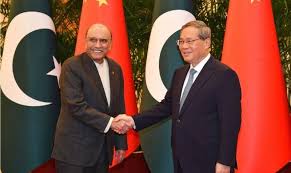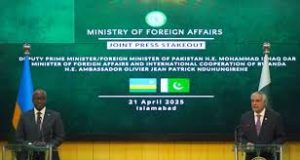Romina urges South Asian countries to unite for regional climate action

Baku: Coordinator to Prime Minister on Climate Change, Romina Khurshid Alam on Tuesday urged South Asian countries to boost collaboration to deal with the common but adverse impacts of climate change on biodiversity, mountain communities and their livelihoods.
The PM’s aide expressed these views while addressing a ministerial meeting of the HKH countries titled ‘High-Level Meeting of Heads of States from the Hindu Kush Himalaya (HKH) Region’, at COP29.
She further said that the HKH region, often referred to as the ‘Water Tower of Asia’ is home to over 1.3 billion people, supporting the livelihoods, water and biodiversity needs of nearly a quarter of humanity. However, these once-stable ecosystems are now under severe strain from climate change, presenting an unprecedented challenge for all countries in the region.
The PM’s climate aide emphasized that the mountain parts in the HKH region are disproportionately impacted by natural disasters, such as floods and landslides leading to massive damages and socio-economic losses.
Besides, the region’s cryosphere, which is home to thousands of glaciers, has witnessed alarming changes in recent years, particularly in its glaciers exacerbating water stress, threatening agriculture, energy, and biodiversity security.
Refering to a recent study by an Italy’s international research organisation, Romina Khurshid Alam said that Pakistan, which is home to over 13,000 glaciers in the Hindu Kush, Karakoram, and Himalayan ranges, has experienced firsthand the negative effects of these changes.Pakistan’s cuisine
“The rapid glacier melting in Pakistan and other HKH regional countries not only has endangred water security but also increased the risks of natural disasters like glacial lake outburst floods (GLOFs) and land erosion, which pose unprecedented threats to downstream communities, which heavily rely on glacial-melt water resources for cultivating crops and meeting other water needs,” she highlighted during her speech at the ministerial event.
“Given the enormity of the environmental challenges being faced by the HKH regions and its communities, no country in the region can tackle these crises in isolation, making regional cooperation and international support more essential to achieve regional resilience,” Romina Khurshid Alam emphasized.
She said further said that Pakistan stands committed to advancing regional partnerships and facilitating collaborative action, such as through the Mountain Area Partnership and the Global Snow Leopard and Ecosystem Protection Programme, with aim to safeguard ecosystems, protect species, and build climate resilience across the region.
“We at the global climate summit (COP29) are emphasizing at every accessible forum here in Baku the critical importance of accessible means of implementation and climate finance under the UNFCCC financial mechanisms, PM’s climate aide informed the participatns of the ministerial meeting from India, Bangladesh, Bhutan and Nepal.
Ensuring the ease of access to finance is crucial for enabling effective climate action and safeguarding the livelihoods of mountain communities in the face of growing climate risks, she remarked.
Romina Khurshid Alam said, “As we gather here in Baku, let us unite in our resolve to protect the invaluable resources of the HKH region. Through strengthened cooperation, targeted investments, and the mobilization of international support, we can foster a sustainable, resilient future for the HKH and its people.”
Ministers from Bhutan, India, Nepal also supported the Pakistani PM’s climate aide Romina Khurshid Alam’s call for unified response to common regional climate risks, particularly those hitting hard the vulnerable mountain communities, their livelihoods and ecosystems.
She thanked the ministers from the regional South Asian countries for agreeing to boost collaboration for tackling common environmental challenges and climate risks for the sake of protecting lives and livelihoods of the millions of vulnerable communities and infrastructures.





